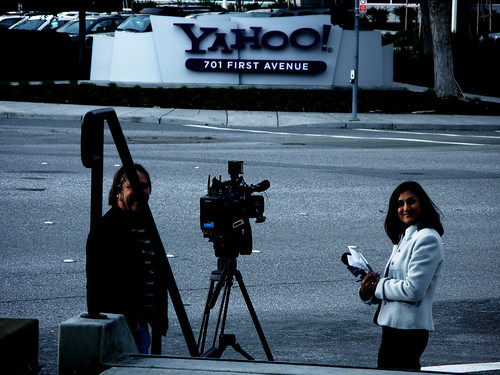When I was working at Yahoo!, Microsoft tried to acquire Yahoo!. And I generally thought of it as a bad idea. At the time, my feelings were that if the deal went through, it would almost certainly mean the end of both companies… and I wasn’t too interested in working for Microsoft.
Although I didn’t mind that the price that YHOO went to was above the strike price on my options.

In order to make that sound reasonable… YHOO had to tell people that the company, as a going concern, was worth more than the $33 per share that Microsoft was offering.
I quit when the stock was just peaking around $18/share before going downhill again. And it’s up lately largely because they actually found a new CEO who sounds fairly strong. Meanwhile, Microsoft is writing down their first ever giant loss, mostly related to an acquisition that didn’t go anywhere — aQuantive. It’s a ‘paper’ loss, where Micorosft recognizes that they paid $6.3 billion dollars for a bundle of stuff (company name, technology, people, etc) and that bundle of stuff is now worthless. It’s not like they wrote a $6.2 billion dollar check to somebody, it’s just that if they were going to try and sell off the stuff they purchased when they purchased aQuantive, they’d likely only get $100 million not $6.3 billion.
Also remember that Yahoo isn’t exactly losing money, they just aren’t growing the amount of money they do make.. it’s just that most people both in Wall Street and the valley feel that if something big doesn’t change, eventually there will be giant losses.
I tend to think that between 2008 and now, the combined YHOO+MSFT would have declined in value faster than YHOO did now. I’ve felt this the whole time, really. Mostly, it’s branding. You can’t buy goodwill. I tend to assert without any evidence that a chunk of Yahoo’s core audience is people who don’t want to go with one of the big bad companies — and both Microsoft and Google are big bad companies in ways that Yahoo isn’t.
I thought about explaining what the integration would have ended up looking like, but I don’t really think it’s appropriate. So I’ll just say, unless you are solely buying the Yahoo! brand name, the technological integration and leadership situation would have been very unpleasant. And I think that the write-down on aQuantive is further evidence that I’m probably right.
And, frankly, they both have the same fundamental problem. They made bankloads of money in the past but they need to find new ways to make bankloads of money before the previous ways of making money stops working. And both of them have a pretty characteristic history of either failing to make the hard decisions necessary to actually jump at the next market or making the wrong decision (the former is both easier and more disastrous than the latter)
I don’t think that the Microsoft acquisition, at the time, was especially frightening. It was during one of the better times of the economy, which therefore meant that they’d either offer me a nice retention plan or they wouldn’t and I’d find a new job. And, while I’d be sad about Yahoo!‘s impending doom, I wouldn’t necessarily be that sad about Microsoft’s impending doom. And, in retrospect, I’m probably a little too jovial about a casual disaster that would have taken people’s future with it. It’s the other Yahoo! layoff rounds and a generalized frustration about the decline of one’s employer that one has worked to save from giant expensive nasty outages that’s the icebergs in the sea of bad memory.
I do wish the new Yahoo CEO well. I tend to think that Marissa Mayer brings a better brand than Scott Thompson. There are people who love her and people who really hate her in the industry. But at least she’s not some guy who people have only mostly vaguely heard of who it turns out was diddling his resume. But it’s a tough road. But at least she’ll be able to hire people for an absurd amount of money who wouldn’t have accepted an offer for the same absurd amount of money that Scott Thompson might have offered. I know that’s a weird thing to say, but…
And, if nothing else, we’ll eventually be like the other old folks in the valley… like the people who worked at SGI or during the days where HP had the HP Way.